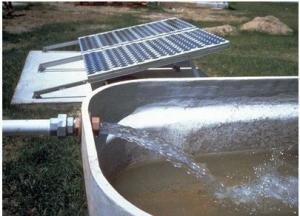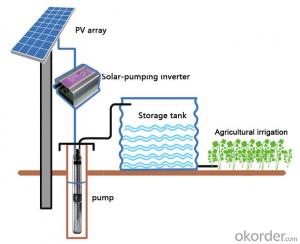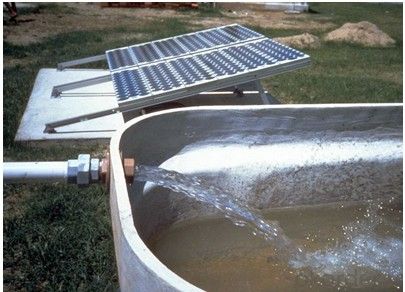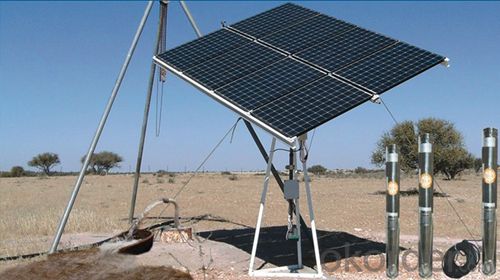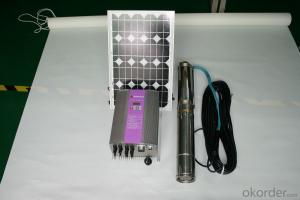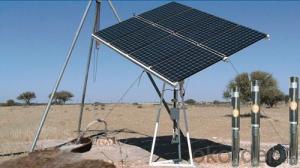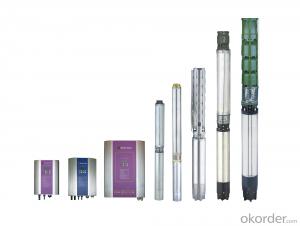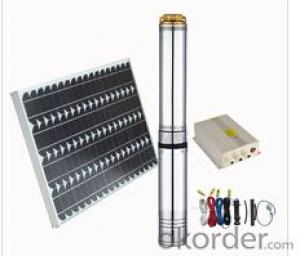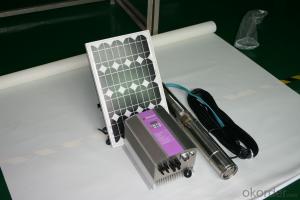Pondmax Solar Pump - Passive Solar Water Heater for Irrigation
- Loading Port:
- Shanghai
- Payment Terms:
- TT OR LC
- Min Order Qty:
- 1 set
- Supply Capability:
- 1000 set/month
OKorder Service Pledge
OKorder Financial Service
You Might Also Like
Passive Solar Water Heater Solar Pumps For Irrigation
DC solar water pumping system consists of the motor, pump, controller, solar array and some other accessories, such as water level sensor, float switch, etc. Considered that storing water is more efficient than storing electricity, the system is designed to directly drive the pump without battery which can reduce the construction and operating cost and routine maintenance effectively.The PV array consists of multiple solar panels connected in series/parallel, which can supply the whole system as power source by converting the absorbed solar radiation energy to the electrical energy. The pump driven by a brushless DC permanent magnet motor draws water from deep-well or river. The pumped water is then fed into reservoir or water tank, or connected to the irrigation system or fountain system directly.
Advanced Technology
Applications Innovation
The efficiency of DC brushless permanent magnet motor has been increased up to 25% in comparison with traditional asynchronous motor.
Technology Innovation
Stator and rotor are sealed by environment friendly casting resin.Motor insulation resistance can be hold higher than 300MΩfor more than 10 years, which consumedly increased the security and reliability of the submersible motor.
Structure Innovation
Casting resign technology processed stator and rotor as well as the water lubricated bearing make the submersible pump environment friendly.
Feature
High Efficiency & High Reliability
DC Brushless Permanent Magnet Motor
Minimum Maintenance, long Service Life
Environment Friendly Materials, Lubricated Without Oil
Application
Village or Family Water Supply
Animal Drinking Water & Livestock Watering
Garden/Courtyard Irrigation
Swimming Pool
Water Supply for Bivouac or Camping Car
Water Supply for Remote Area
Automatic Control
Operate Automatically, No Need Watching
Maximum Power Point Tracking (MPPT)
Dry-run Protection
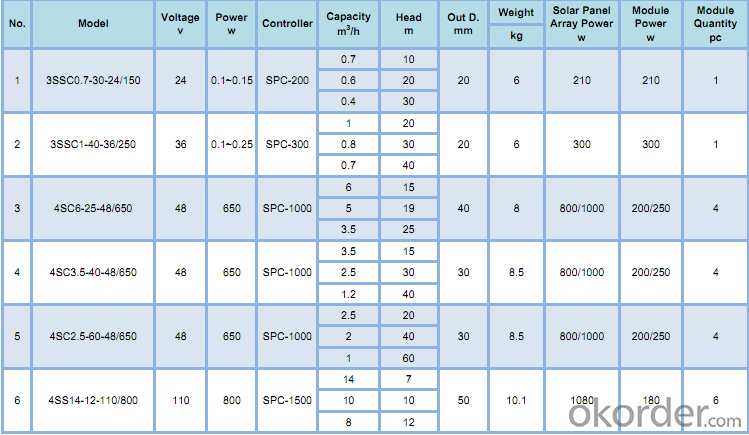
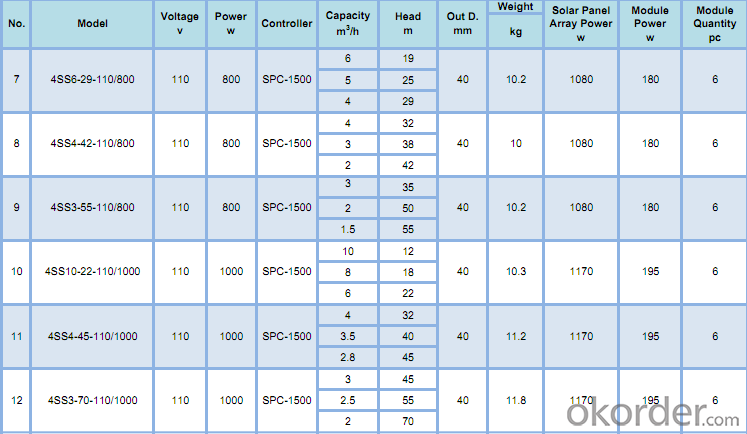
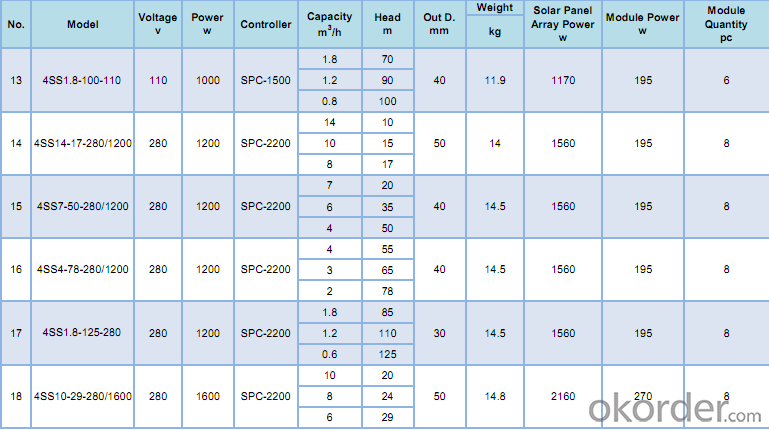
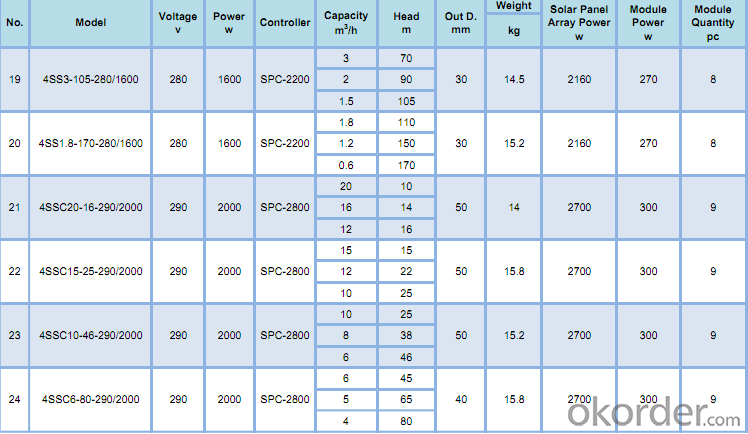
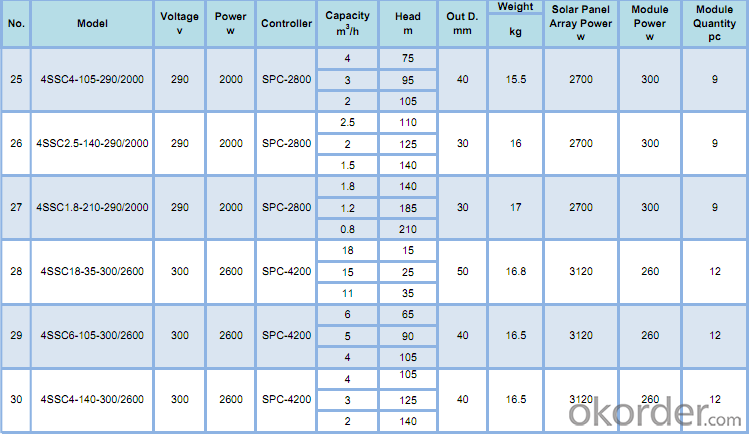
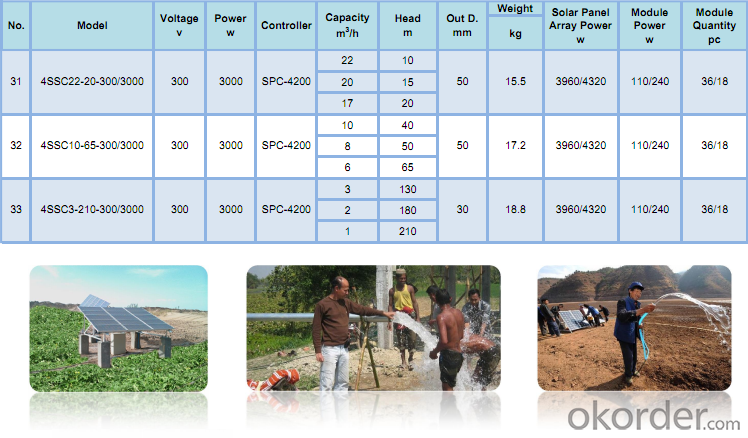
- Q: Can a solar pump be used for water supply in off-grid islands?
- Yes, a solar pump can be used for water supply in off-grid islands. Solar pumps are an ideal solution for remote areas where access to electricity is limited or non-existent. By harnessing solar energy, these pumps can effectively draw water from wells, rivers, or other water sources, providing a reliable and sustainable water supply. They are cost-effective, environmentally friendly, and can operate independently without the need for grid connectivity, making them well-suited for off-grid islands.
- Q: Can a solar pump be used for water circulation in ponds?
- Yes, a solar pump can be used for water circulation in ponds. Solar pumps are specifically designed to operate using solar energy and can effectively circulate water in ponds, providing aeration and preventing stagnation. They are environmentally friendly and cost-effective alternatives to traditional electric pumps, as they harness the power of the sun to operate.
- Q: How does a solar pump handle water with high levels of ammonia or other pollutants?
- A solar pump with high levels of ammonia or pollutants can handle the water through various filtration and purification techniques. Firstly, a pre-filtration system is often used to remove large particles and debris from the water. Then, additional filtration methods such as activated carbon filters or reverse osmosis membranes can be employed to specifically target ammonia and other pollutants. These filtration systems effectively remove or reduce the concentration of contaminants, ensuring that the water pumped is clean and suitable for use.
- Q: What is the lifespan of a solar pump?
- The lifespan of a solar pump varies depending on factors such as the quality of the pump, maintenance practices, and environmental conditions. On average, a well-maintained solar pump can last for 15-20 years.
- Q: Can a solar pump be used in disaster relief efforts?
- Certainly! A solar pump is capable of being utilized in disaster relief endeavors. When a disaster occurs, access to clean water becomes an essential requirement. Conventional water pumps that rely on electricity or fuel may not be readily accessible or may have limited availability in such circumstances. Conversely, solar pumps are powered by sunlight, rendering them a dependable and sustainable solution for water pumping in areas affected by disasters. Solar pumps are self-sufficient and do not necessitate any external fuel or electricity supply, which is particularly advantageous in disaster situations where power grids may be disrupted or nonexistent. They are simple to install and can be rapidly deployed to provide immediate access to clean water. Furthermore, solar pumps have low maintenance requirements, reducing the necessity for constant monitoring and servicing, which can be challenging in regions affected by disasters. These pumps can be employed to extract water from wells, rivers, or any other water sources, serving as a lifeline for impacted communities. They can be utilized to provide drinking water, irrigate agricultural fields, or support sanitation efforts, thereby addressing multiple needs during disaster relief operations. Additionally, solar pumps are environmentally friendly, emitting no greenhouse gases or pollutants. This aspect of sustainability is critical in disaster scenarios, as it aids in minimizing further harm to the already vulnerable environment and supports long-term recovery efforts. In conclusion, solar pumps offer an effective, dependable, and sustainable solution for water pumping during disaster relief endeavors. Their ability to function independently of electricity grids or fuel supplies makes them an ideal choice for providing immediate access to clean water in disaster-affected areas.
- Q: Can a solar pump be used for water supply in parks or recreational areas?
- Certainly, parks and recreational areas can undoubtedly utilize solar pumps for their water supply. Solar pumps offer a sustainable and environmentally friendly solution since they operate using solar energy. They eliminate the need for grid electricity or fuel, resulting in cost-effectiveness and a reduced carbon footprint. By drawing water from wells, ponds, or rivers, solar pumps can efficiently distribute it throughout the park or recreational area. This water can be used for various purposes, including irrigation, drinking water fountains, decorative water features, and even filling up swimming pools or water play areas. Additionally, the installation process is simple, and maintenance requirements are minimal, making solar pumps the ideal choice for parks and recreational areas where a dependable and efficient water supply is crucial.
- Q: Can a solar pump be used for water supply in agricultural greenhouses?
- Yes, a solar pump can be used for water supply in agricultural greenhouses. Solar pumps are increasingly being used in greenhouse farming as they are cost-effective, environmentally friendly, and can provide a reliable source of water for irrigation. By harnessing solar energy, these pumps can efficiently draw water from wells, rivers, or other sources and distribute it to the crops within the greenhouse, ensuring optimal growth and productivity.
- Q: Can a solar pump be connected to a battery for backup power?
- Indeed, it is possible to connect a battery to a solar pump for backup power. By employing this arrangement, the solar pump can continue functioning even in the absence of sunlight or under dim lighting circumstances. Throughout the day, the solar panels replenish the battery's charge, thus storing surplus energy to be utilized by the pump when necessary. This guarantees an uninterrupted water supply, even during overcast weather or throughout the night. Furthermore, connecting the solar pump to a battery for backup power not only ensures stability but also safeguards the pump against potential harm caused by fluctuations in solar energy availability.
- Q: Can a solar pump be used for industrial processes requiring water circulation?
- Yes, a solar pump can be used for industrial processes requiring water circulation. Solar pumps are increasingly being used in various industrial applications due to their many advantages. They are powered by solar energy, which means they are environmentally friendly and have low operating costs compared to traditional pumps that rely on fossil fuels or electricity. Solar pumps can be designed to handle large volumes of water and can be used for various purposes such as irrigation, water supply, and water circulation in industrial processes. They are particularly useful in remote areas where grid electricity may not be available or reliable. With advancements in technology, solar pumps are now capable of delivering high water pressures and flows, making them suitable for industrial processes that require efficient water circulation. They can be integrated with storage systems or battery banks to ensure continuous operation even during periods of low sunlight. Additionally, solar pumps can be equipped with variable frequency drives (VFDs) to control the flow rate and pressure of the pumped water, allowing for precise control and optimization of industrial processes. Overall, solar pumps are a viable and sustainable solution for industrial processes requiring water circulation. They offer numerous benefits including reduced operating costs, environmental friendliness, and reliable performance.
- Q: Can a solar pump be used for water circulation in cooling systems?
- Yes, a solar pump can be used for water circulation in cooling systems. Solar pumps are designed to run on solar power, which means they can operate without being connected to the grid. This makes them a sustainable and cost-effective option for water circulation in cooling systems, especially in areas with abundant sunlight. Solar pumps can be used to circulate water through heat exchangers, radiators, or other cooling components, helping to remove heat and maintain optimal temperatures in the system. They are commonly used in solar water heating systems and can also be utilized in air conditioning systems or industrial cooling processes. Overall, solar pumps offer a green and efficient solution for water circulation in cooling systems, reducing energy consumption and environmental impact.
Send your message to us
Pondmax Solar Pump - Passive Solar Water Heater for Irrigation
- Loading Port:
- Shanghai
- Payment Terms:
- TT OR LC
- Min Order Qty:
- 1 set
- Supply Capability:
- 1000 set/month
OKorder Service Pledge
OKorder Financial Service
Similar products
Hot products
Hot Searches
Related keywords
